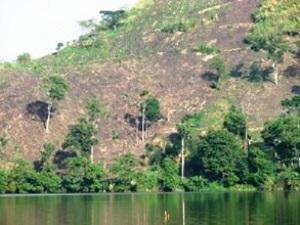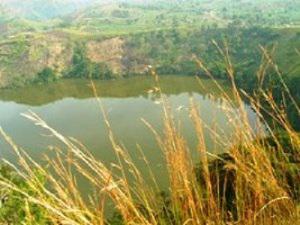Jackson Efitre
Other projects
13 May 2004
Predictive Yield Models for Crater Lake Fisheries of Uganda: An Unexpected Marriage of Rural Development and Conservation
The aim of the project is to arrest the rapid degradation of natural forests around the crater lakes in western Uganda.

Increasing rates of deforestation is a global concern, particularly in the tropics where the effects of deforestation on aquatic systems remain largely unknown (Chapman & Chapman, 2003). Effects of deforestation may particularly be acute in areas with high topographic relief such as the crater lakes of western Uganda due to their small size, steep-sided slopes, and limited flushing. There are approximately 90 volcanic crater lakes along the foothills of the Rwenzori Mountains in western Uganda.

The greatest threat to these lakes is deforestation of their crater rims associated with the need for fuel wood, building materials, and conversion to agricultural land (Chapman & Chapman, 2003). High levels of deforestation increase soil erosion leading to increased turbidity, nutrient load, and cultural eutrophication (Crisman et al., 2003, Efitre, 2007). Deforestation level is also a major contributor to changes in productivity within the crater lakes which in turn affects the condition and growth of tilapia populations (Efitre, 2007). Currently many of the lakes are not protected from degradation, and there is little awareness of potential impacts of present and future environmental change on these lakes. There is a critical need to restore forests around the crater rims, monitor water quality, and sensitize the local communities in order to mitigate negative consequences of environmental change within the crater lakes region.
The aim of this project is to arrest the rapid degradation of natural forests around the crater lakes in western Uganda. This will be achieved through a community-centred reforestation around catchments of selected heavily deforested crater lakes using suitable indigenous tree seedlings.
Reforestation of crater rims will not only promote a conservation ethic among the local communities but also enable them exercise environmental stewardship as part of their own livelihood improvement. In addition, tree planting will help in mitigating effects of climate change within the region. It is believed that the geographically extensive Rwenzori Mountain Range and its associated lake and river basins are already experiencing the effects of climate change. Furthermore, the community-based approach adopted in this project will lead to capacity building for environmental conservation and sustainable natural resources management that will help relieve pressure on the remaining forests and fisheries resources in the crater lakes. Enhanced capacity of local communities will enable them take on the stewardship of their natural resources beyond the life span of this project.